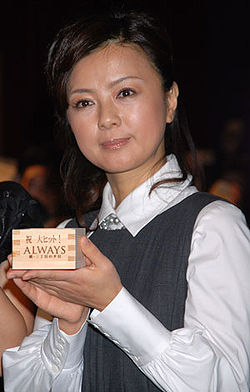Generasia would not be possible without tokyograph and all the wonderful people who've contributed over the past 15 years. Thank you!
Difference between revisions of "Yakushimaru Hiroko"
m |
m |
||
| Line 48: | Line 48: | ||
* [1989.10.04] [[Windy Boy]] | * [1989.10.04] [[Windy Boy]] | ||
* [1990.05.09] [[Te wo Tsunaideite]] (手をつないでいて) | * [1990.05.09] [[Te wo Tsunaideite]] (手をつないでいて) | ||
| − | * [1991.01.30] [[Kaze ni Notte]] (風に乗って) | + | * [1991.01.30] [[Kaze ni Notte (Yakushimaru Hiroko)|Kaze ni Notte]] (風に乗って) |
* [1997.06.21] [[Kousaten ~Sou Sore ga Sou~]] (交叉点 〜そう それがそう〜) | * [1997.06.21] [[Kousaten ~Sou Sore ga Sou~]] (交叉点 〜そう それがそう〜) | ||
* [1997.12.03] [[Koibumi ~Aishuuhen~]] (恋文 〜哀愁篇〜) | * [1997.12.03] [[Koibumi ~Aishuuhen~]] (恋文 〜哀愁篇〜) | ||
Revision as of 21:14, 6 April 2011
Yakushimaru Hiroko (薬師丸ひろ子) is a Japanese pop singer and actress. Yakushimaru got her start in show business in 1979 when she auditioned and starred with Takakura Ken as the heroine in the television dorama movie Yasei no Shuumei. She soon later starred in the movie Sailor Suit to Kinkanjuu two years later. She also release the theme song, "Sailor Fuku to Kikanjuu", to the movie soon after, signaling the start of her music career. The single and her appearance in the movie made Yakushimaru a major hit.
In 1991, she married Tamaki Kouji until they divorced seven years later. She later won her first Japan Academy Award for Best Supporting Actress in the movie Always Sanchome no Yuhi.
Profile
- Real Name: Yakushimaru Hiroko (薬師丸博子)
- Birthdate: June 9, 1964
- Birthplace: Minato, Tokyo, Japan
- Blood Type: A
Discography
Studio Albums
- [1984.02.14] Kokonshuu (古今集)
- [1985.08.08] Mujuu Hanashi (夢十話)
- [1986.06.09] Hana Zukan (花図鑑)
- [1987.07.06] Seikigyou (星紀行)
- [1988.04.06] SINCERELY YOURS
- [1989.02.15] LOVER'S CONCERTO
- [1990.03.28] Heart's Delivery
- [1991.03.13] PRIMAVERA
- [1998.02.04] -Koibumi- LOVE LETTER (-恋文-LOVE LETTER)
Other Albums
- [1987.12.25] '87 Yakushimaru Hiroko First Live Sekigyou ('87 薬師丸ひろ子ファーストライブ星紀行) (live album)
- [1988.08.05] SENTENCE (SENTENCE~セ・ン・テ・ン・ス~) (best album)
- [2000.04.19] Love Collection (best album)
- [2002.11.20] Yakushimaru Hiroko Golden☆Best (薬師丸ひろ子 ゴールデン☆ベスト) (best album)
Singles
- [1981.11.21] Sailor Fuku to Kikanjuu (セーラー服と機関銃)
- [1983.05.25] Tantei Monogatari (探偵物語)
- [1984.05.16] Main Theme (メイン・テーマ)
- [1984.10.24] Woman ~W no Higeki~ Yori (Woman "Wの悲劇"より)
- [1985.07.03] Anata wo Motto Shiritakute (あなたを・もっと・知りたくて)
- [1985.09.06] Ten ni Hoshi, Chi ni Hana (Newly Remix Long Verison) (天に星.地に花.(ニュー・リミックス・ロングヴァージョン))
- [1985.11.01] Suteki na Koi no Wasure Kata (ステキな恋の忘れ方)
- [1986.10.19] Sasayaki no Step (ささやきのステップ)
- [1986.11.24] Shinshi Doumei (紳士同盟)
- [1987.10.10] Mune Furiko (胸の振子)
- [1988.03.30] Owari Gakushou (終楽章)
- [1988.07.29] Jidai (時代)
- [1989.01.25] Katari Tsugu Ai ni (語りつぐ愛に)
- [1989.10.04] Windy Boy
- [1990.05.09] Te wo Tsunaideite (手をつないでいて)
- [1991.01.30] Kaze ni Notte (風に乗って)
- [1997.06.21] Kousaten ~Sou Sore ga Sou~ (交叉点 〜そう それがそう〜)
- [1997.12.03] Koibumi ~Aishuuhen~ (恋文 〜哀愁篇〜)
- [1998.04.21] smile Smile smile (smile スマイル smile)
- [2000.02.23] Love holic
